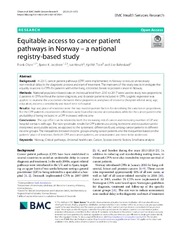| dc.contributor.author | Olsen, Frank | |
| dc.contributor.author | Jacobsen, Bjarne K. | |
| dc.contributor.author | Heuch, Ivar | |
| dc.contributor.author | Tveit, Magne Kjell | |
| dc.contributor.author | Balteskard, Lise | |
| dc.date.accessioned | 2022-02-11T10:10:09Z | |
| dc.date.available | 2022-02-11T10:10:09Z | |
| dc.date.issued | 2021-11-25 | |
| dc.description.abstract | Background: In 2015, cancer patient pathways (CPP) were implemented in Norway to reduce unnecessary
non-medical delay in the diagnostic process and start of treatment. The main aim of this study was to investigate the
equality in access to CPPs for patients with either lung, colorectal, breast or prostate cancer in Norway.<p>
<p>Methods: National population-based data on individual level from 2015 to 2017 were used to study two proportions;
i) patients in CPPs without the cancer diagnosis, and ii) cancer patients included in CPPs. Logistic regression was
applied to examine the associations between these proportions and place of residence (hospital referral area), age,
education, income, comorbidity and travel time to hospital.<p>
<p>Results: Age and place of residence were the two most important factors for describing the variation in proportions.
For the CPP patients, inconsistent differences were found for income and education, while for the cancer patients the
probability of being included in a CPP increased with income.<p>
<p>Conclusions: The age effect can be related to both the increasing risk of cancer and increasing number of GP and
hospital contacts with age. The non-systematic results for CPP patients according to income and education can be
interpreted as equitable access, as opposed to the systematic differences found among cancer patients in different
income groups. The inequalities between income groups among cancer patients and the inequalities based on the
patients’ place of residence, for both CPP and cancer patients, are unwarranted and need to be addressed. | en_US |
| dc.identifier.citation | Olsen F, Jacobsen bk, Heuch I, Tveit MK, Balteskard L. Equitable access to cancer patient pathways in Norway – a national registry-based study. BMC Health Services Research. 2021;21(1):1-13 | en_US |
| dc.identifier.cristinID | FRIDAID 1970787 | |
| dc.identifier.doi | 10.1186/s12913-021-07250-1 | |
| dc.identifier.issn | 1472-6963 | |
| dc.identifier.uri | https://hdl.handle.net/10037/24015 | |
| dc.language.iso | eng | en_US |
| dc.publisher | BMC | en_US |
| dc.relation.ispartof | Olsen, F. (2022). Geographic and socioeconomic variation in the utilisation of specialist health care services in Norway – Three selected health care services. (Doctoral thesis). <a href=https://hdl.handle.net/10037/25374>https://hdl.handle.net/10037/25374</a>. | |
| dc.relation.journal | BMC Health Services Research | |
| dc.rights.accessRights | openAccess | en_US |
| dc.rights.holder | Copyright 2021 The Author(s) | en_US |
| dc.title | Equitable access to cancer patient pathways in Norway – a national registry-based study | en_US |
| dc.type.version | publishedVersion | en_US |
| dc.type | Journal article | en_US |
| dc.type | Tidsskriftartikkel | en_US |
| dc.type | Peer reviewed | en_US |


 English
English norsk
norsk